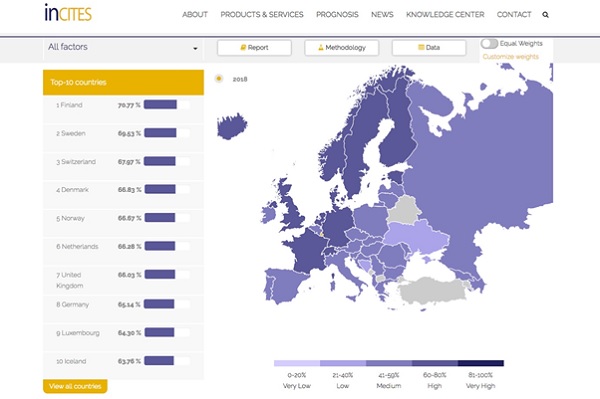
Luxembourg-based inCITES Consulting has developed a new online tool that measures the readiness of 38 European countries to develop and adopt 5G networks; currently Luxembourg is in 9th position, with Finland at the top.
The Europe 5G Readiness Index consists of six main criteria categories comprising a total of 35 sub-criteria. The Index gathers data from multiple sources and aims to help to the telecom industry's effort to quickly deploy 5G networks.
5G networks are directly linked to the objectives set by the Digital Agenda for Europe and are expected to provide a means to reduce the digital divide and improve the life and work quality of European citizens. inCITES Consulting's 5G Readiness Index could be a useful tool in the hands of policy makers to identify the relative strengths and weakness of their country as compared to other markets in adopting 5G.
Factor Categories deep dive
Europe 5G Readiness Index measures the performance of 38 European countries on six factor categories that are expected to determine the deployment and adoption of 5G networks.
• The first category, Infrastructure and Technology, includes factors related to existing fixed and mobile networks that will be used as a basis for 5G networks. This category also includes a country's preparatory steps for the development of 5G networks, such as spectrum auctions and pilot networks.
• The second category, Regulatory and Policy, includes factors related to the flexibility of the regulatory framework which will be crucial to facilitating the smooth and rapid development of 5G networks.
• The third category, Innovation Landscape, includes factors related to a country's R&D activities, its innovation capabilities, the availability of funds to support it and the cooperation between universities and the industry.
• The fourth category, Human Capital, is linked to the quality of the education system and the on-the-job training initiatives that could be useful for the development and adoption of new technologies.
• The fifth category, Country Profile, includes factors related to a country's current economic situation, telco industry competition and the importance of new technologies for the state.
• The last category, Demand, includes factors related to the adoption of fixed and mobile communications and technology networks as well as the use of the Internet.
A quick look at the results
Finland, Sweden and Switzerland are in the first three places in the list, countries that have traditionally led the way in the development and adoption of new technologies, while Moldova, Ukraine and Bosnia and Herzegovina are in the bottom of the table. The results of the analysis show that there is a significant gap between Western and Eastern Europe, with the countries of the former being, on average, more ready to welcome launch and adopt 5G. Also, there appears to be a high correlation between the position of a country in the index and its geographical position, which creates three clusters of countries with common characteristics. It is also not surprising that a country's well-being, as measured by its GDP per capita, appears to be positively correlated with its 5G readiness.








